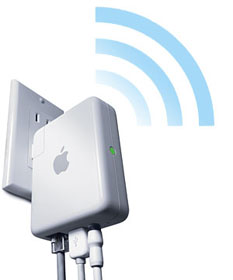Wi-Fi Reaches the Speed of Ethernet

Wireless networks may be convenient to set up, but wired ethernet has always been faster. Now a new generation of Wi-Fi products is challenging ethernet's superiority for high-bandwidth apps. We sampled some of the first of these Wi-Fi products--Netgear's $180 RangeMax 240 Wireless Router and $100 Notebook Adapter--and found that at close range, even with encryption enabled, data speeds were only a little bit slower than on a standard 10/100 megabits-per-second ethernet network.
The RangeMax 240 line is based on Airgo Networks' new True MIMO Gen3 technology (also used in Linksys's new SRX240 line). Like Airgo's original True MIMO chip set (found in Belkin's Pre-N, Linksys's SRX, and other product lines), True MIMO Gen3 uses two transmitting and three receiving antennae to boost speed and range, while maintaining backward compatibility with standard 54-mbps 802.11g Wi-Fi products.
Ace Technology
But the real key to Gen3's performance is Airgo's new Adaptive Channel Expansion technology, which doubles bandwidth by using two of the three nonoverlapping channels in 802.11g's 2.4-MHz frequency. ACE instantly adapts to interference to find the fastest route for data. Netgear named the router for its theoretical maximum 240-mbps data rate, but Netgear and Airgo peg real-world Gen3 throughput at up to 120 mbps or more without encryption--and up to four times the range of standard 802.11g Wi-Fi.
Our informal tests with preproduction units generally backed up these claims. Without encryption, throughput matched that of 10/100 ethernet, and with WPA2 encryption, it was nearly as fast. (We would expect slower speeds with the software-based WPA-PSK encryption.)
Performance was between one-third and two-thirds faster than that of networks based on the original True MIMO chips, and, even more impressive, the RangeMax 240 network maintained both signal strength and performance over a much greater distance. We even noticed speed increases of about a third using legacy 802.11g adapters with the RangeMax 240 router.
This kind of speed is ideal for homes and offices that want to simultaneously run such bandwidth-gobbling applications as VoIP telephony, network gaming, and streaming audio and video. With RangeMax 240 gear, we streamed flawless DVD-format video from a desktop hard drive to a wireless laptop 100 feet away, while surfing the Net. When we attempted the same tasks using gear based on Airgo's first chips, however, the video broke down.
The technology would be even more useful if it were available for devices other than notebooks: No adapters yet exist for desktops, set-top boxes, or other consumer electronics. And the RangeMax 240 router costs more than twice as much as some of the newer budget Wi-Fi routers, which offer good range and performance if you're only accessing the Internet (broadband speeds typically top out at 1 to 1.5 mbps) or moving an occasional file between computers.
Still, if you want the optimum wireless performance--say, to back up over a network or to maintain good coverage in a large structure--these impressive new products are worth the investment.
Source
The RangeMax 240 line is based on Airgo Networks' new True MIMO Gen3 technology (also used in Linksys's new SRX240 line). Like Airgo's original True MIMO chip set (found in Belkin's Pre-N, Linksys's SRX, and other product lines), True MIMO Gen3 uses two transmitting and three receiving antennae to boost speed and range, while maintaining backward compatibility with standard 54-mbps 802.11g Wi-Fi products.
Ace Technology
But the real key to Gen3's performance is Airgo's new Adaptive Channel Expansion technology, which doubles bandwidth by using two of the three nonoverlapping channels in 802.11g's 2.4-MHz frequency. ACE instantly adapts to interference to find the fastest route for data. Netgear named the router for its theoretical maximum 240-mbps data rate, but Netgear and Airgo peg real-world Gen3 throughput at up to 120 mbps or more without encryption--and up to four times the range of standard 802.11g Wi-Fi.
Our informal tests with preproduction units generally backed up these claims. Without encryption, throughput matched that of 10/100 ethernet, and with WPA2 encryption, it was nearly as fast. (We would expect slower speeds with the software-based WPA-PSK encryption.)
Performance was between one-third and two-thirds faster than that of networks based on the original True MIMO chips, and, even more impressive, the RangeMax 240 network maintained both signal strength and performance over a much greater distance. We even noticed speed increases of about a third using legacy 802.11g adapters with the RangeMax 240 router.
This kind of speed is ideal for homes and offices that want to simultaneously run such bandwidth-gobbling applications as VoIP telephony, network gaming, and streaming audio and video. With RangeMax 240 gear, we streamed flawless DVD-format video from a desktop hard drive to a wireless laptop 100 feet away, while surfing the Net. When we attempted the same tasks using gear based on Airgo's first chips, however, the video broke down.
The technology would be even more useful if it were available for devices other than notebooks: No adapters yet exist for desktops, set-top boxes, or other consumer electronics. And the RangeMax 240 router costs more than twice as much as some of the newer budget Wi-Fi routers, which offer good range and performance if you're only accessing the Internet (broadband speeds typically top out at 1 to 1.5 mbps) or moving an occasional file between computers.
Still, if you want the optimum wireless performance--say, to back up over a network or to maintain good coverage in a large structure--these impressive new products are worth the investment.
Source




0 Comments:
Post a Comment
<< Home